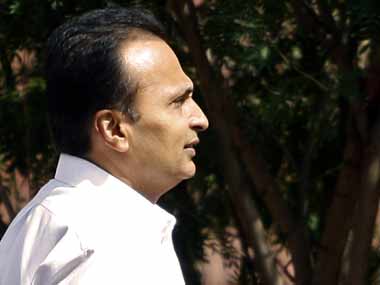Disclosures emanating from the UK’s Financial Services Authority (FSA) are increasingly beginning to point a finger at Anil Ambani’s Reliance Group for using an offshore fund to invest in a group company in India.
According to a report in the Financial Times , the UK regulator found that the group had “invested $250m in the offshore fund that in 2007 bought securities linked to one of the companies within the group.”
The Reliance group apparently created an investment vehicle called Pluri Cell E through its private bankers at Swiss bank UBS, which, in turn, invested money in Indian equity and derivatives of a Reliance company.
Though the FT report did not specifically say so, it hinted that the company was Reliance Communications.
In January this year, the Indian markets regulator, Sebi, settled for a penalty of Rs 50 crore on the group through a “ consent order ” under which Anil Ambani and four of his board members were barred from investing in the markets till the end of the year. Two group companies, Reliance Natural Resources Ltd (RNRL) and Reliance Infrastructure, were also banned from accessing the capital market for two years, for irregular “market dealings”.
Sebi had accused RNRL and Reliance Infra of misrepresenting the nature of investments in “yield management certificates/deposits” and profit and loss accounts in the years 2006-07, 2007-08 and 2008-09.
A consent order is one where the company or party being investigated accepts a fine without accepting guilt. This is done in order to avoid prolonged litigation.
However, what looked buried in the Sebi consent order now appears to be resurfacing in the UK FSA’s investigation into compliance failure at UBS and the working of its private banking cell.
Impact Shorts
More ShortsThe FSA’s disclosures have surfaced in a case involving its former private bankers who allegedly set up Ambani’s offshore fund based in Mauritius. The FSA is pursuing disciplinary action against UBS and its former employees for poor regulatory oversight.
[caption id=“attachment_164753” align=“alignleft” width=“380” caption=“Sebi needs to take a closer look at this alleged round-tripping of Reliance funds.Reuters”]
 [/caption]
[/caption]
The Financial Times report, quoting FSA documents, says that “Pluri Cell E bought derivatives, known as equity swaps, whose underlying shares referenced an unnamed Reliance company. Separate documents published by Sebi in 2010 name Pluri Cell E as the ultimate beneficiary of derivatives whose underlying security was Reliance Communications.”
According to the newspaper, Pluri closed out the swaps and opted for equity - Reliance Communications’ global depository receipts (GDRs) listed abroad. “There were worth $300m by the end of October 2007.”
Putting all the pieces together, what the FSA investigations seem to suggest is that money from Anil Ambani group companies were invested in a Mauritius fund with the help of private bankers in UBS, and this money then found its way back into his own companies in some form.
Says the FT article: “The FSA maintained that $250m was invested in Pluri Cell E from December 4, 2006 until October 9, 2007. During this period, Reliance Communications shares rose from Rs 443.80 to Rs 706.95, according to Bloomberg data.”
Sebi needs to take a closer look at this alleged round-tripping of Reliance funds.
)